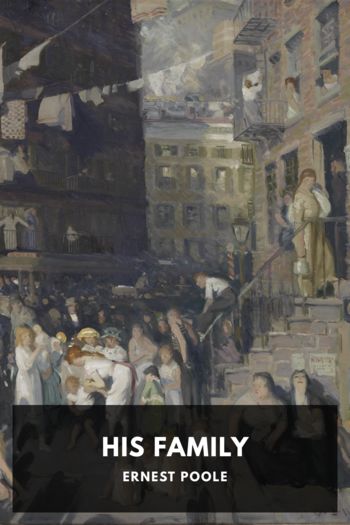His Family - Ernest Poole (ereader for comics .txt) 📗

- Author: Ernest Poole
Book online «His Family - Ernest Poole (ereader for comics .txt) 📗». Author Ernest Poole
“So you want me to turn him out! Tonight!”
“No, I want you to wait a few days—until we can find him a decent home.”
“All right, I won’t do it!”
“Very well, father—it’s your house, not mine.”
For a few moments longer she sat at her sewing, while her father walked the floor. Then abruptly she rose, her eyes brimming with tears, and left the room. And he heard a sob as she went upstairs.
“Now she’ll shut herself up with her children,” he reflected savagely, “and hold the fort till I come to terms!” Rather than risk a hair on their heads, Edith would turn the whole world out of doors! He thought of Deborah and he groaned. She would have to be told of this; and when she was, what a row there would be! For Johnny was one of her family. He glanced at the clock. She’d be coming home soon. Should he tell her? Not tonight! Just for one evening he’d had enough!
He picked up the book he had meant to read—Stoddard’s “Lectures on Japan.” And Roger snorted wrathfully. By George, how he’d like to go to Japan—or to darkest Africa! Anywhere!
XXIXBut later in the evening, when Allan and Deborah came in, Roger, who in the meantime had had a good hour in Japan and was somewhat relaxed and soothed, decided at once this was the time to tell her and have done with it. For Deborah was flushed with triumph, the meeting had been a huge success. Cooper Union had been packed to the walls, with an overflow meeting out on the street; thousands of dollars had been pledged and some big politicians had promised support; and men and women, rich and poor, had volunteered their services. She started to tell him about it, but noticed his troubled expression and asked him what was on his mind.
“Oh, nothing tremendous,” Roger said. “I hate to be any damper tonight. I hadn’t meant to tell you tonight—but I think I will now, for you look as though you could find a solution for anything.”
“Then I must look like an idiot,” his daughter said good-humoredly. “What is it?” she demanded.
“It’s about John.” Her countenance changed.
“Oh. Is he worse?”
“Edith thinks he is—and she says it’s not safe.”
“I see—she wants him out of the house. Tell me what she said to you.” As he did so she listened intently, and turning to Allan at the end, “What do you say to this, Allan?” she asked. “Is there any real risk to the children?”
“A little,” he responded. “As much as they take every day in the trolley going to school.”
“They never go in the trolley,” Deborah answered dryly. “They always go on the top of the bus.” She was silent for a moment. “Well, there’s no use discussing it. If Edith feels that way, John must go. The house won’t be livable till he does.”
Roger looked at her in surprise. He felt both relieved and disappointed. “John’s only one of thousands to her,” he told himself aggrievedly. “He isn’t close to her, she hasn’t room, she has a whole mass meeting in her head. But I haven’t, by George, I like the boy—and I’m the one who will have to tell him to pack up and leave the house! Isn’t it the very devil, how things all come back on me?”
“Look here, father,” Deborah said, “suppose you let me manage this.” And Roger’s heavy visage cleared.
“You mean you’ll tell him?”
“Yes,” she replied, “and he’ll understand it perfectly. I think he has been expecting it. I have, for a good many weeks,” she added, with some bitterness. “And I know some people who will be glad enough to take him in. I’ll see that he’s made comfortable. Only—” her face clouded.
“It has meant a lot to him, being here,” her father put in gruffly.
“Oh, John’s used to getting knocks in this world.” Her quiet voice grew hard and stern. “I wasn’t thinking of John just now. What frightens me at times like this is Edith,” she said slowly. “No, not just Edith—motherhood. I see it in so many mothers these days—in the women downtown, in their fight for their children against all other children on earth. It’s the hardest thing we have to do—to try to make them see and feel outside of their own small tenement homes—and help each other—pull together. They can’t see it’s their only chance! And all because of this mother love! It’s so blind sometimes, like an animal!” She broke off, and for a moment she seemed to be looking deep into herself. “And I suppose we’re all like that, we women are,” she muttered, “when we marry and have children. If the pinch is ever hard enough—”
“You wouldn’t be,” said Allan. And a sudden sharp uneasiness came into Roger’s mind.
“When are you two to be married?” he asked, without stopping to think. And at once he regretted his question. With a quick impatient look at him, Allan bent over a book on the table.
“I don’t know,” Deborah answered. “Next spring, I hope.” The frown was still on her face.
“Don’t make it too long,” said her father brusquely. He left them and went up to bed.
Deborah sat motionless. She wished Allan would go, for she guessed what was coming and did not feel equal to it tonight. All at once she felt tired and unnerved from her long exciting evening. If only she could let go of herself and have a good cry. She locked her hands together and looked up at him with impatience. He was still at the table, his back was turned.
“Don’t you know I love you?” she was thinking fiercely. “Can’t you see it—haven’t you seen it—growing, growing—day after day? But I don’t want you here tonight! Why can’t you see you must leave me alone? Now! This minute!”
He turned and came over in front of her, and stood looking





Comments (0)